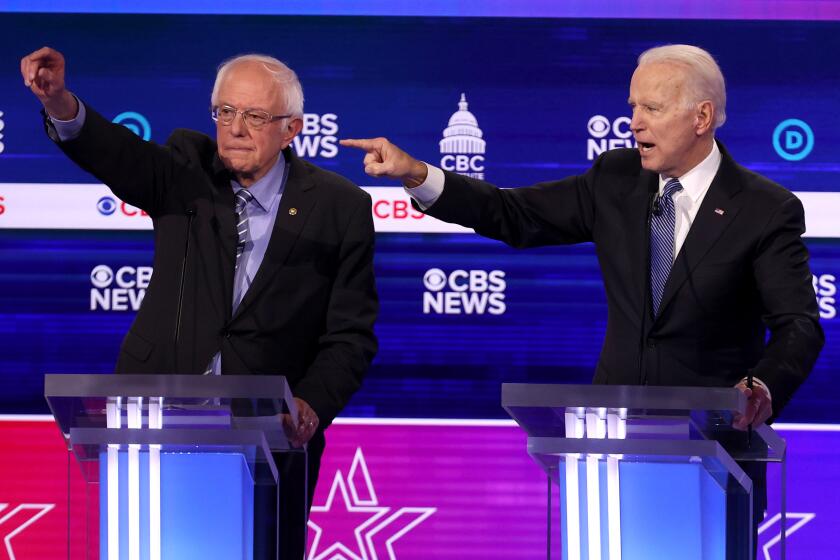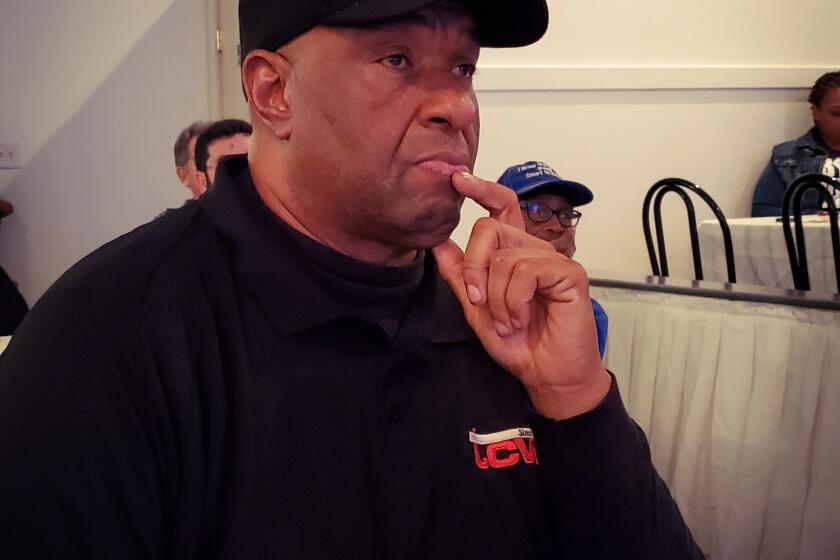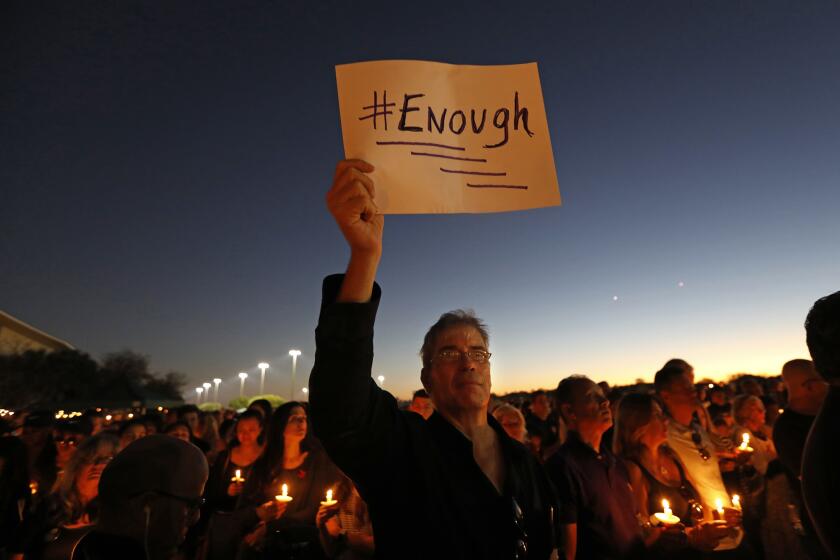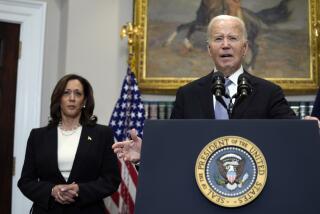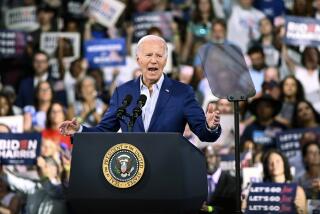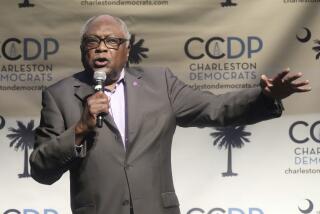Rivals hammer Bernie Sanders at South Carolina Democratic debate
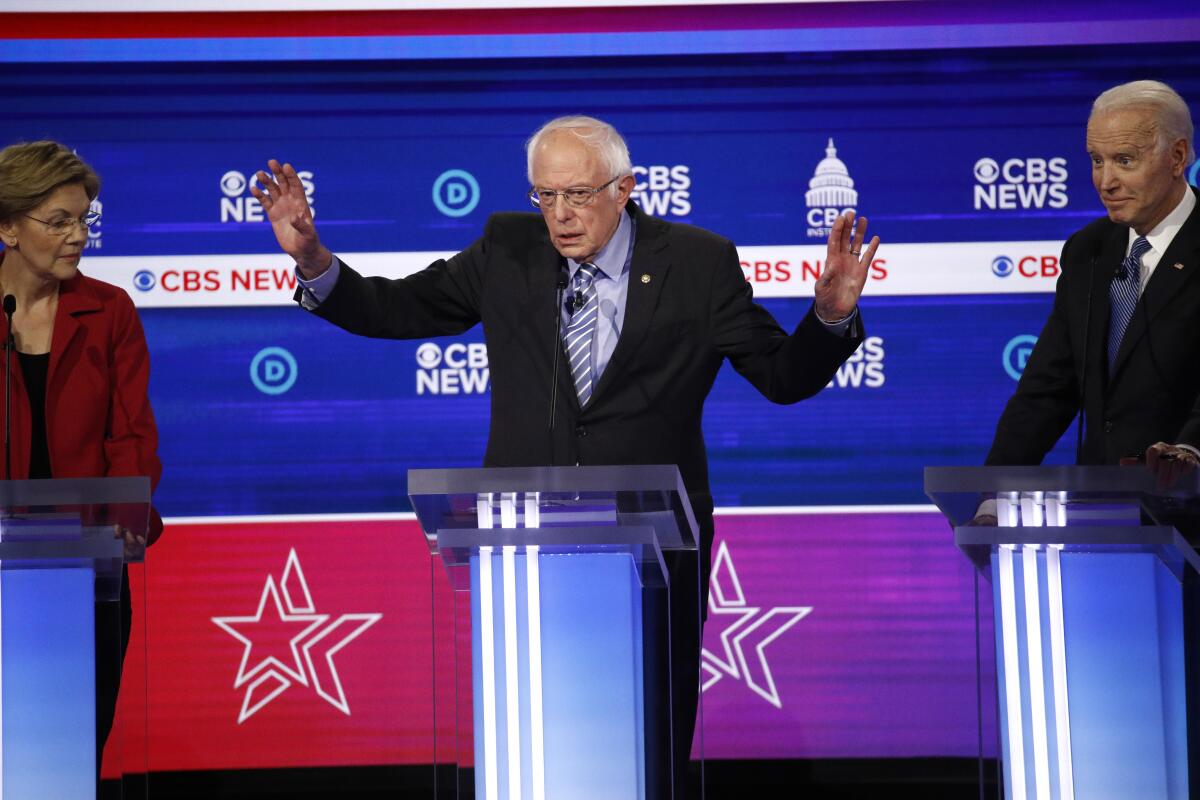
- Share via
CHARLESTON, S.C. — Rival Democratic candidates moved urgently to blunt Bernie Sanders’ momentum Tuesday, charging in a crucial debate here that he is misleading voters about the cost of his ambitious agenda and warning that his nomination would cost Democrats not just the White House but down-ballot races across the country.
The attacks were relentless and reflected the growing sense of panic among moderate Democrats since the decisive Sanders win in Nevada on Saturday, and his rise in national polls. The democratic socialist from Vermont threatens to build a lead toward the nomination that could become insurmountable.
Sanders was challenged for his complimentary words about the late Cuban dictator Fidel Castro and sympathies with other communists. He was branded a tool of the National Rifle Assn. He was charged with selling voters a fantasy of free healthcare and free college with no chance of getting congressional buy-in.
Appearing unrattled, the 78-year-old senator made the case he has built for decades: that the economy and political system are rigged in favor of elites to deprive most Americans of adequate wages, healthcare and educational opportunities.
“If you look at battleground states like Michigan, Wisconsin and Pennsylvania, polling just done this Sunday, I beat Trump,” Sanders said. “And if you want to beat Trump, what you’re going to need is an unprecedented grass-roots movement of black and white and Latino, Native American and Asian, people who are standing up and fighting for justice. That’s what our movement is about.”
Sanders get swarmed, Bloomberg is better, Biden goes big and Warren loses the element of surprise.
Sanders’ rivals only recently began intensifying their attacks at him after wrongly assuming he could not build a broad enough coalition to win the nomination. But his nearly across-the-board win in Nevada dispelled that, and now they may be too late to stop him.
“We are not going to win these critical House races if people in those races have to explain why the nominee of the Democratic Party is telling them to look at the bright side of the [Fidel] Castro regime,” said Pete Buttigieg, the former mayor of South Bend, Ind.
“We just cannot afford some of this stuff,” billionaire Michael R. Bloomberg, the former New York mayor, said of the Sanders agenda. “If you keep on going, we will elect Bernie. Bernie will lose to Donald Trump. … And the House and the Senate and some of the statehouses will all go red. And then, between gerrymandering and appointing judges, for the next 20 or 30 years, we’re going to live with this catastrophe.”
Bloomberg and the other remaining moderates have sought to elbow one another out of the way and become the clear counterweight to Sanders, but none has clearly emerged as his challenger. Instead, they frequently shouted over one another in heated exchanges, spending as much time attacking one another as the front-runner.
The Democratic debate in South Carolina helped some black voters in Charleston narrow their choices before Saturday’s primary, but they didn’t appreciate all the bickering.
Former Vice President Joe Biden stopped speaking at the moderator’s request at one point — but then made a joke emblematic of how he has struggled in the rough and tumble of the 2020 campaign.
“Why am I stopping? No one else stops,” he complained. “Catholic school training. Gentlemen don’t get very well treated up here.”
Bloomberg, desperate for a strong performance after his flop on the debate stage in Nevada last week, confronted more headwinds, as other candidates charged that he is a dilettante using his billions to try to buy the nomination.
Massachusetts Sen. Elizabeth Warren targeted him for his past support of Republican candidates. She noted that he contributed to GOP Sen. Lindsay Graham of South Carolina, whom Democrats hope to defeat for reelection this year; as well as former Massachusetts Sen. Scott Brown, whom Warren unseated in 2012.
“I don’t care how much money Mayor Bloomberg has. The core of the Democratic Party will never trust him,” she said. “That means he is the riskiest candidate on the stage.”
She cited an allegation that Bloomberg once asked a pregnant employee, “Are you going to kill it?” Bloomberg denied that he ever said it. And he grew testy when Warren pushed him anew to release from nondisclosure agreements all the women who have sued his media empire for discrimination and harassment.
“I don’t know what else she wants us to do,” Bloomberg said, noting he authorized releases from confidentiality agreements after Warren pushed him at the debate last week. “The trouble is with this senator, enough is never enough. I am going to focus on other things. We just cannot continue to relitigate this.”
Bloomberg has spent more than half a billion dollars on advertising and organization since launching his campaign in November, but has yet to appear on any ballots. He is banking on challenging Sanders in the 14 Super Tuesday states, including California, that will vote on March 3.
He is battling against Biden for dominance of the centrist lane of the race. But Biden focused his attacks on Sanders and California billionaire Tom Steyer, who both have eroded Biden’s earlier strong lead in South Carolina, a state that has become crucial for him to win following a string of disappointing results elsewhere.
Early in the debate, Biden referred to the 2015 shooting at the nearby Emanuel African Methodist Episcopal Church, where a white supremacist gunman killed nine black worshipers, to criticize Sanders for votes against gun control measures. Biden often struggled to be heard over the crosstalk.
“Bernie voted five times against the Brady bill,” Biden said. “I’m not saying he’s responsible for the nine deaths, but that man would not have been able to get that weapon if the waiting period had been” longer, as Biden had sought.
Assault weapons bans, red flag laws, gun buybacks: Here’s where the Democratic presidential candidates stand on combating gun violence.
Sanders acknowledged his past record on gun restrictions was out of step with the party’s current consensus, but said he is now a strong gun control proponent with a D-minus rating from the National Rifle Assn.
He took the occasion to tweak Biden for his support, when he was a senator from Delaware, for free trade deals and the Iraq invasion in 2003.
“Joe has voted for terrible trade agreements; Joe voted for the war in Iraq,” Sanders said. ”I have cast thousands of votes, including bad votes. That was a bad vote.”
South Carolina, with its large African American population, has long been viewed as Biden’s “firewall.”
But that wall appears in danger of falling as Sanders gains momentum in the state. If Biden does not win here on Saturday, his argument that he is the most electable Democratic candidate, the one with the most diverse coalition of support, risks collapse.
That danger moved him to take a shot at a private investment made by Steyer, a former hedge fund manager who has spent considerably more money than all the other candidates in South Carolina, hoping a strong showing will propel him into contention for the nomination. Much of his support has come at Biden’s expense.
“He in fact bought a system that was a private prison system, after he knew that in fact what happened was they hogtied young men in prison here in this state,” Biden said. “After he knew that he bought it and then he said he was proud of his accomplishment.”
Steyer said he bought stock in a prison company because he thought it would do a good job, but sold the stock when he realized he was wrong.
“Since then I’ve worked to end the use of private prisons in my home state, and we’ve ended it,” he said.
Biden dismissed Steyer’s defense of his record on criminal justice issues with three words: “Tommy come lately.”
Buttigieg and Sen. Amy Klobuchar of Minnesota arrived at the debate far behind in polls in South Carolina and the big Super Tuesday states. Buttigieg effectively tied Sanders for first in Iowa, and Klobuchar pulled a surprise third-place finish in New Hampshire, but both have struggled since.
Their campaigns threaten to drain votes from Biden and Bloomberg even as the two Midwesterners strained to make the case that moderates should rally around them, not Biden or Bloomberg, to stop Sanders.
“Do you want to have someone in charge of this ticket, who wants to put forward $60 trillion in spending, three times the American economy?” Klobuchar asked. “I don’t think we do. I think that we can get all those progressive things done without having someone that is so alienating that we’re going to turn off the voters that we need to bring in.”
Buttigieg, a military veteran, tried to position himself as best equipped to take on the job of commander in chief. He noted that he first came to South Carolina for basic training.
Bloomberg, whose views on foreign and defense policy are less well known than the other candidates, was asked whether U.S. troops should be brought home from the Middle East, as Warren has suggested.
He said no, invoking the terrorist attacks of Sept. 11, 2001— which happened months before he became mayor of New York City.
“You want to cut it back as much as you can, but I think we learned something from 9/11. People plan things overseas and execute them here,” he said. “We have to be able to stop terrorism.”
Bloomberg also turned to foreign policy early in the debate, jabbing Sanders over reports that U.S. intelligence agencies have determined that Russia is intervening in the 2020 election to help him. Bloomberg argued that the Kremlin, which sought to help Trump in 2016, was trying to help Sanders win reelection.
“Vladimir Putin thinks that Donald Trump should be president of the United States, and that’s why Russia is helping you,” Bloomberg told Sanders.
Sanders pushed back and said he wanted to send a message to Putin: “If I am president of the United States, trust me: You’re not going to be interfering in any more American elections.”
The Vermonter also held his own when rivals attacked his history of complimenting the social programs of communist regimes.
“I have opposed authoritarianism all over the world,” Sanders said. “What I said is what Barack Obama said in terms of Cuba, that Cuba made progress on education.”
His response prompted boos from the audience. “Really?” Sanders said in response. “Literacy programs are bad?”
Biden, who was Obama’s vice president, rejected Sanders’ characterization of Obama’s comments.
“He did not in any way suggest that there was anything positive about the Cuban government,” Biden said. “He acknowledged that they did increase life expectancy, but he went on and condemned the dictatorship.”
“Authoritarianism of any stripe is bad,” Sanders said. “But that is different than saying that governments occasionally do things that are good.”
Halper reported from Washington, Hook reported from Charleston, and John reported from Los Angeles.
More to Read
Get the L.A. Times Politics newsletter
Deeply reported insights into legislation, politics and policy from Sacramento, Washington and beyond. In your inbox twice per week.
You may occasionally receive promotional content from the Los Angeles Times.
